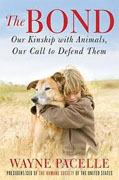The Bond
Wayne Pacelle
book reviews:
· general fiction
· chick lit/romance
· sci-fi/fantasy
· graphic novels
· nonfiction
· audio books
· author interviews
· children's books @
curledupkids.com
· DVD reviews @
curledupdvd.com
newsletter
win books
buy online
links
home
for authors
& publishers
for reviewers

 |
The Bond: Our Kinship with Animals, Our Call to Defend Them Wayne Pacelle William Morrow Hardcover 448 pages April 2011 |
|
Most of us ooh and ah when we see kittens, puppies, and other baby animals, and some of us have the same reaction to fully grown animals. We bring them into our lives and into our homes; we feed them, play with them, and in general, we provide them with safety and tender care.
In a single case, that might be true; but anyone who has spent significant time actually being with animals (as opposed to studying them) knows better. There was no territorial issue involved when Binti Jua, a gorilla at Brookfield Zoo in Chicago, rescued a three-year-old human boy who had fallen into the gorilla enclosure. Binti Jua, carrying her own baby on her back, stepped into the middle of a group of male gorillas and warned them away from the boy before gently picking up the child and placing him near the door where zoo workers could take him. A neuropeptide called oxytocin promotes the maternal instinct in animals. That isn’t oxytocin’s only role, however; it also helps us to feel warmth, trust, and empathy for others, and it reduces stress and lowers blood pressure. Research experiments conducted with humans and dogs found the interaction increases and even doubles the amount of oxytocin in humans, dramatically lowering blood pressure. Throughout recorded history, humans have formed deliberate bonds with animals. They may not have known about chemical reactions, but that companionship induced an unmistakable sense of well-being, warmth, and general pleasure. Author Wayne Pacelle is the president and CEO of the Humane Society of the United States and obviously invested in the relationship between humans and animals. He is loathed and despised by some, and all but worshipped by others. Whatever your feeling about Pacelle and his agenda, there’s no denying that The Bond In the first section of the book, Pacelle writes of heartwarming encounters, such as the rescue by Binti Jua and other animals that have reacted in a similarly protective fashion toward humans and other animals. Section two focuses on the ugly side of the human-animal relationship. Here, Pacelle details the brutality of factory farming, the culling of wild animals, and the barbarous practice of animal fighting. Perhaps the biggest surprise in the book appears in this section, when Pacelle interviews Michael Vick, the athlete convicted of running a dog-fighting operation. Throughout their conversation, Vick continues to insist that he loves and admires the very dogs he was responsible for torturing. “…Vick’s rationale sounded very familiar. He was one of many people who abused animals while telling themselves they loved them.”It is such contradictions that Pacelle uses as a hub for the widespread reach of The Bond In section three, Pacelle addresses the possibility of building a truly humane world. Recognition of the contradiction is central to changing the way we allow ourselves to ignore and deny what really happens. “Here is the greatest challenge in the cause of animal protection: the problem is not disagreement with the broad principle that animals deserve kindness and protection, but in the consistent application of that truth.”Pacelle asks us to give thought to our lack of consistency in this area. Why do we cuddle kittens and eat lambs? Where is the line between a companion animal and a predator that must be destroyed? And what do our answers to those questions say about humans as a species? As The Bond Originally published on Curled Up With A Good Book at www.curledup.com. © Deborah Adams, 2011 |
|
|
|
 Click here to learn more about this month's sponsor! |
|
| fiction · sf/f · comic books · nonfiction · audio newsletter · free book contest · buy books online review index · links · · authors & publishers reviewers |
|
| site by ELBO Computing Resources, Inc. | |
 That caring goes both ways. You’ve no doubt known a dog who vigorously defended you against strange people and other dogs by barking, growling, maybe even by biting the intruder. Some would say that the family Labrador is simply standing ground on what he perceives as his own territory, and that the dog has no real notion of friendship or loyalty to the human involved.
That caring goes both ways. You’ve no doubt known a dog who vigorously defended you against strange people and other dogs by barking, growling, maybe even by biting the intruder. Some would say that the family Labrador is simply standing ground on what he perceives as his own territory, and that the dog has no real notion of friendship or loyalty to the human involved.